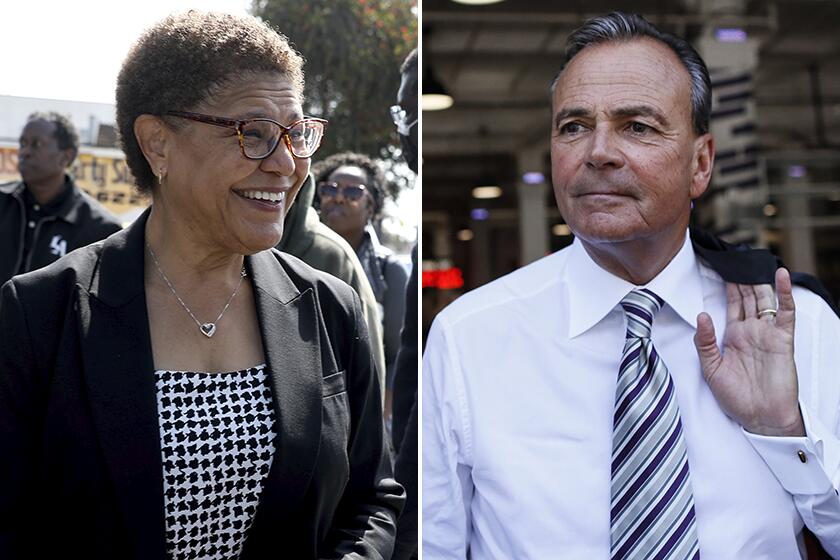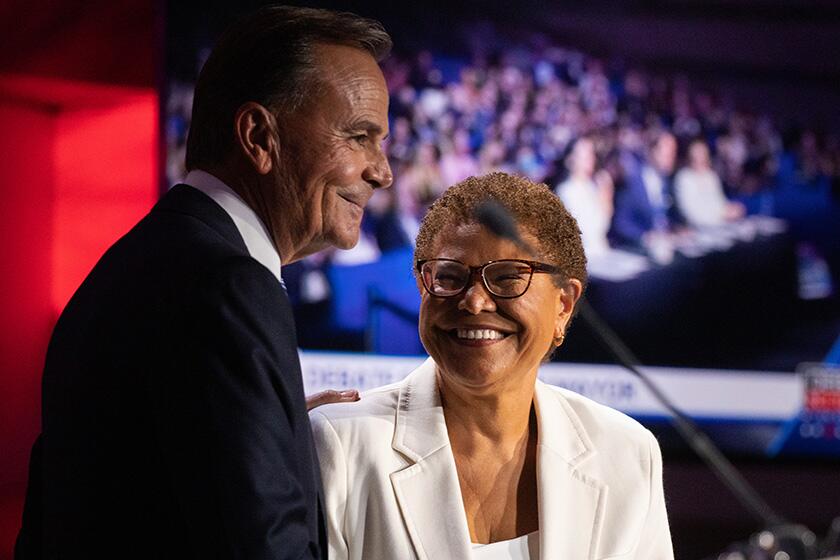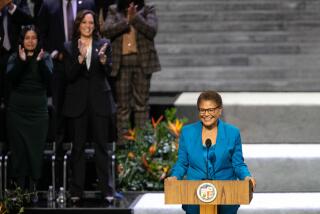Column: Why this election could feel like the beginning of the end of Black power in L.A.
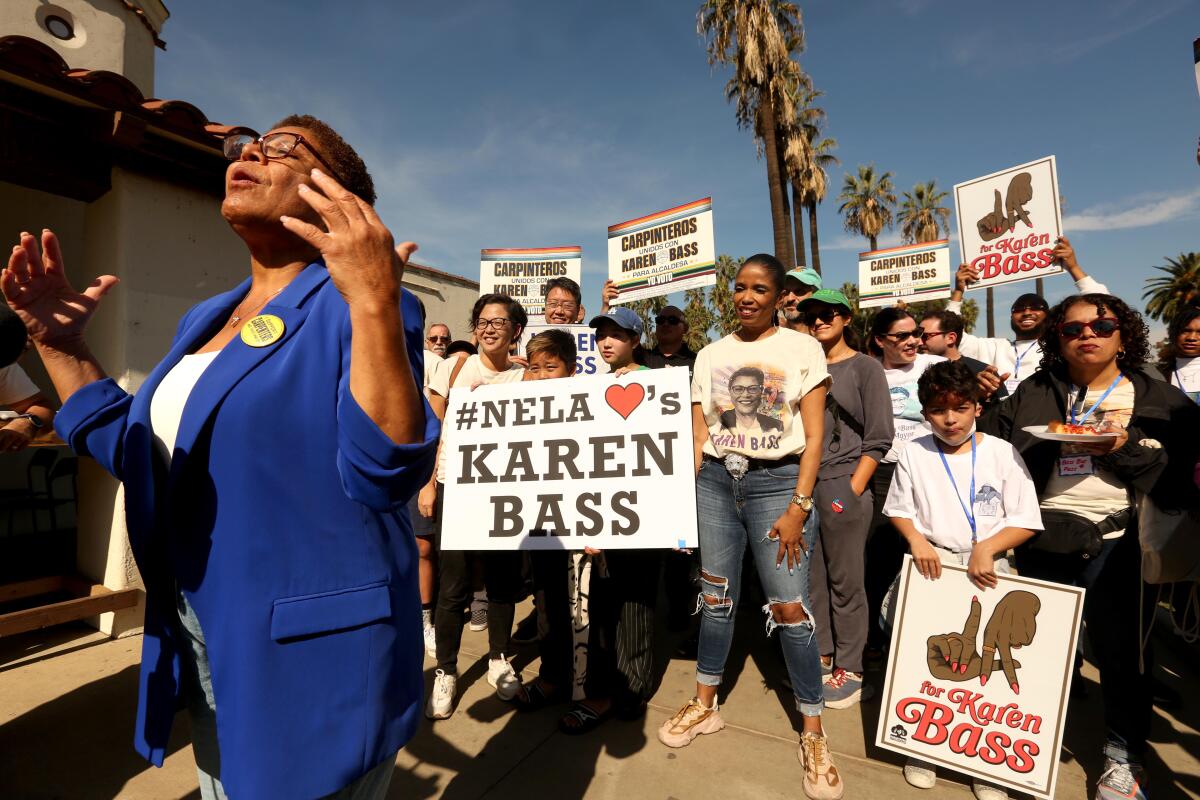
- Share via
The words, shouted into a microphone by a supremely confident campaign hypeman, reverberated across Echo Park Lake.
“Folks, we are in coalition! Take a look around you!”
Indeed, a rambunctious crowd — one, undeniably, as racially and ethnically diverse as the residents of Los Angeles — had just spilled from an open-top double decker tour bus that had been making the rounds to different neighborhoods.
At this stop, mayoral candidate Karen Bass was among the last to get off. As she waded into the crowd, the soundtrack shifted from a disc jockey blasting DMX’s “Ruff Ryders’ Anthem” to the band Tres Souls performing a ballad in Spanish.
“You can’t buy what you see here,” Bass told supporters, repeating one of her new favorite digs at her big-spending billionaire opponent, Rick Caruso. “We have proven that the power of the people is stronger than the power of the dollar.”
As an Angeleno who voted for Bass, I hope she is right.
But with the latest polls showing the race in a dead heat, I can’t help but wonder what it would mean for racial and ethnic relations in Los Angeles if she loses.
Bass holds a narrow edge, but tens of millions of dollars in negative ads have powered Caruso into striking distance.
What kind of reality check would that send about the limits of Black political power in a city that, in some ways, once embodied it? Would Black Angelenos be resentful if denied an opportunity to elect the city’s second Black mayor?
Under normal circumstances, these are questions that wouldn’t even be worth asking. Black Angelenos have overwhelmingly supported political candidates who have lost in the past. Life went on. Coalitions, like the one cheering on Bass at Echo Park Lake, continued.
But these aren’t exactly normal circumstances.
The recently leaked recording of three Latino members of the L.A. City Council and a Latino labor leader using racist tropes while plotting to dilute Black political power has cast an ugly, uncertain shadow over the Nov. 8 election.
At a minimum, the leaked recording has fed into an existing fear of a zero-sum political system that pits Black residents, now 8% of the city’s population, against Latino residents, who account for about half.
“You could be dealing with a hornet’s nest,” said Bernard Parks Jr., who spent more than a decade as chief of staff for his father, Councilmember Bernard Parks. “There are, you know, obviously a lot of hurt feelings over this latest scandal.”
And it won’t help that, if Bass does lose, it will probably go down something like this: Bass would draw massive support from white liberals and Black Angelenos. But Caruso would win, thanks in part to voters in the San Fernando Valley but mostly from a surge of new Latino voters inspired to cast ballots.
According to a UC Berkeley Institute of Governmental Studies poll, released last week and co-sponsored by The Times, Bass is still the front-runner, but her lead has dropped by 15 points since September. She’s now ahead 45% to 41% among likely voters, with 13% saying they remain undecided — a margin that’s solidly within the poll’s margin of error.
Much of this is because Caruso now leads among Latino likely voters, 48% to 31%. In September, Bass was ahead with that same demographic, 35% to 29%.
Money can do that. The real estate developer is projected to spend $100 million on his campaign, about $13 million of which has gone toward hiring workers to go door to door to talk to voters in an unprecedented field operation. He dropped another $26 million on TV, radio and digital advertising, much of it in Spanish.
But it’s not all about money. As my fellow columnist Gustavo Arellano wrote recently, Caruso also has spent a lot of time listening to Latino voters and talking about his own family’s immigration story. That has helped him too.
To win, Caruso would have to boost turnout among Latino voters from the roughly 21% it was in the June primary to closer to 30% of the share of the total electorate. It’s improbable but still entirely possible.
“I do think that there’s a sense of Black loss, that fear of erasure that’s there because of gentrification, there because of demographic change,” said Manuel Pastor, director of the USC Dornsife Equity Research Institute. “And if this proven Black political leader doesn’t make it to be the mayor, that will feed into that.”
::
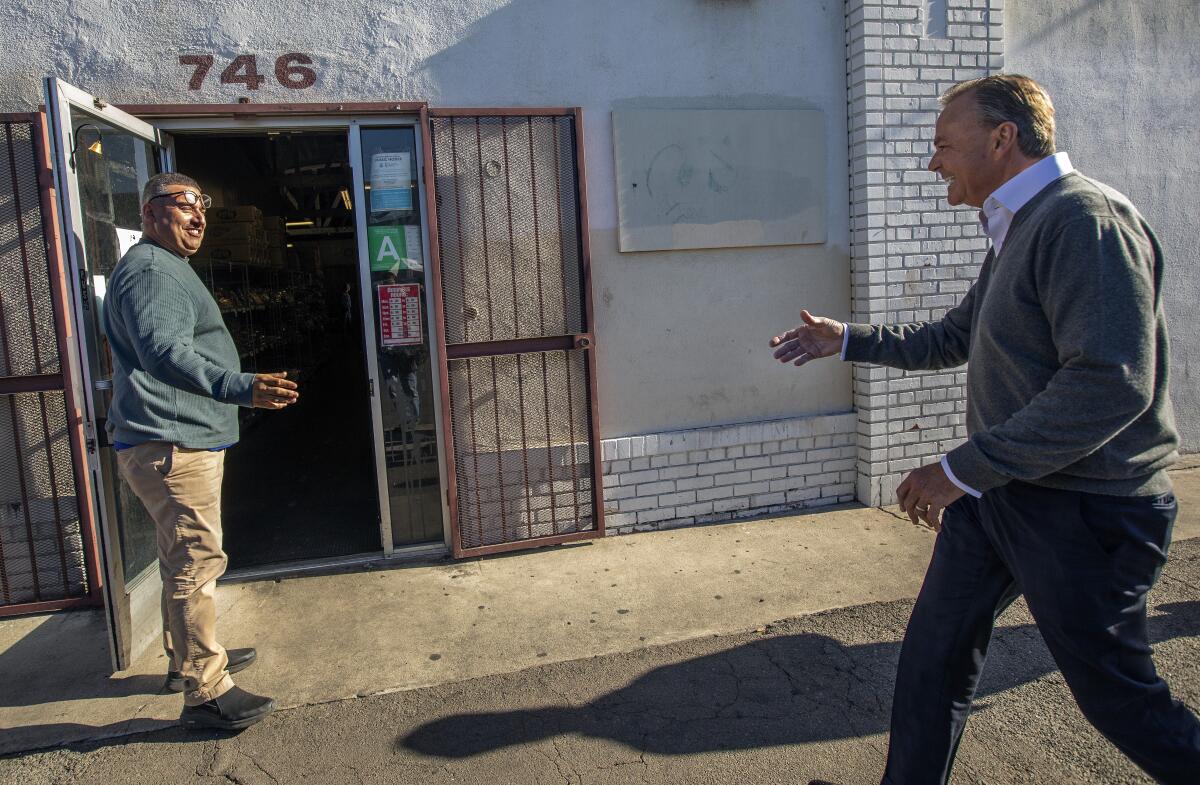
No matter what happens in L.A.’s mayoral race, it’s unfortunately likely to get drawn into the messier national narrative about Democratic Party politics and Latino and Black voters. And that narrative hasn’t been good.
According to the latest national polling, Republicans are likely to retake control of the House and possibly the Senate in the midterm elections. It’s more of a mixed bag for governors, secretaries of state and attorney generals, but Republicans are expected to make gains there too.
How have Democrats landed in such a sad and pathetic position, with a sitting president and two former presidents forced to tour the country, begging left-leaning Americans to vote just to save democracy?
Well, according to the going narrative, the party hasn’t done nearly enough to meet the needs of Latino voters, the fastest-growing group in the U.S. electorate. Or, for that matter, Black voters, widely seen as the backbone of the party.
It’s Black voters who, despite having to contend with a string of new laws that make it harder to cast a ballot, can sway elections now. But it’s Latino voters who will do that in the future.
Yet according to a recent poll from the Kaiser Family Foundation and theGrio, only 22% of Black voters said that Democrats represent their interests very well. And numerous other polls show Latino voters increasingly leaning toward conservative and Republican candidates, though, overall, most Black and Latino voters still plan to cast ballots for Democrats.
What does any of this have to do with the race for mayor in Los Angeles?
Caruso is a registered Democrat, but given his shifting party registration over the years, he’s still seen as a Republican. (Cue Bass talking about how she’s only “true Democrat in the race.”)
L.A. has a half-century tradition of sending Democratic office holders like Karen Bass to the mayor’s office. Rick Caruso needs a big Latino vote to ‘“defy political gravity.”
If he wins, mark my words, the narrative will be about Latino voters rejecting a high-ranking, lifelong member of the Democratic Party in favor of a billionaire businessman who, until earlier this year, was a Republican — and that will only serve to stir up that “hornet’s nest” that Parks was talking about.
Also, in Los Angeles, the future is always now.
Unlike so many cities in so many swing states that are relying on turnout by Black voters in the midterm elections, Latinos make up a far more decisive 37% of registered voters here — particularly compared to when L.A. elected its last Black mayor, Tom Bradley.
“The African American share of the population was twice as large as it is today,” said Raphael J. Sonenshein, executive director of the Pat Brown Institute for Public Affairs at Cal State L.A. “At one point — the high point — I think it was 18% of the population and probably a little bit more among registered voters,” he said. “And that was the first building block of Bradley’s election.”
So what happens if Bass loses? Will Black voters feel as if their votes don’t matter, encouraging even more voter apathy than I’ve already encountered talking to Angelenos who refuse to cast a ballot?
Terrance Woodbury, chief executive officer of HIT Strategies, which has been tracking Black voters in California, North Carolina and Georgia, said polling shows people are most likely to vote when they know it will make a difference in the outcome of a race.
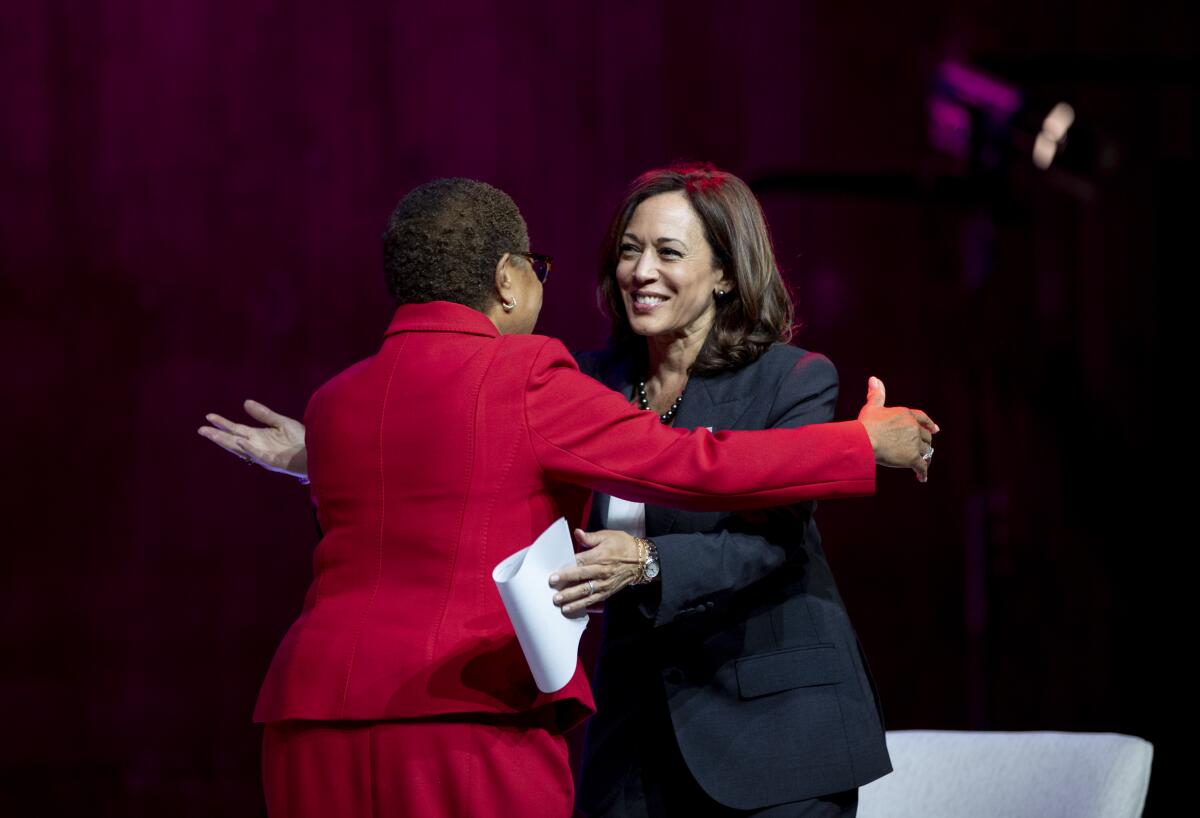
It’s all psychological.
“You lose and then you start thinking about what you lost beyond the campaign,” Parks mused. “Well, maybe you’ve lost Black power. Maybe the statements on those audiotapes are coming true. Maybe we, you know, we aren’t as relevant.”
In reality, nothing would immediately change in terms of Black political power in L.A. if Bass loses. There are still three Black members on the City Council. Black Lives Matter, despite its recent controversies and legal trouble, is still a force to be reckoned with here.
But it would offer further proof of the need for coalitions. Perhaps even more of them. Certainly stronger ones.
“Regardless, we have work to do. We have lots of work to do citywide,” said Alberto Retana, chief executive of Community Coalition, which Bass founded. “What work can I and other Latinos, who are committed to not just Black [and] brown unity, but an anti-Black racist agenda, do to build in terms of infrastructure, outreach and education?”
In another finding in that UC Berkeley poll sponsored by The Times, 77% of Black registered voters and 54% of Latino registered voters said it was “strongly important” for the next mayor to prioritize “coalition building between people of different racial and ethnic backgrounds.”
The same poll found that nearly 70% of registered voters believe that racial and ethnic relations in L.A. are “fair” or “poor.”
In that case, no matter who wins — hopefully Bass, but even Caruso — this can’t be a missed opportunity.
More to Read
Sign up for Essential California
The most important California stories and recommendations in your inbox every morning.
You may occasionally receive promotional content from the Los Angeles Times.
